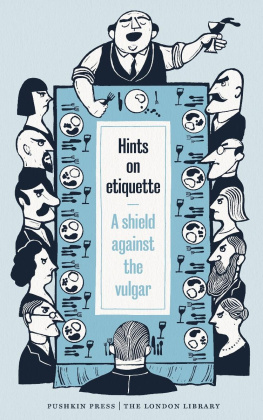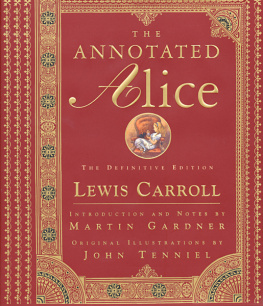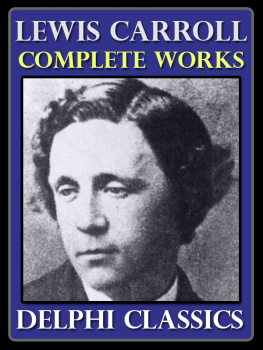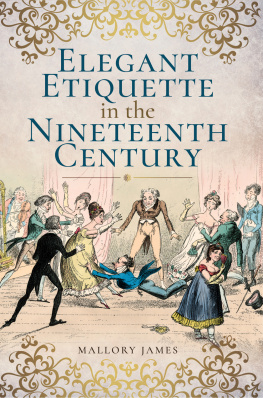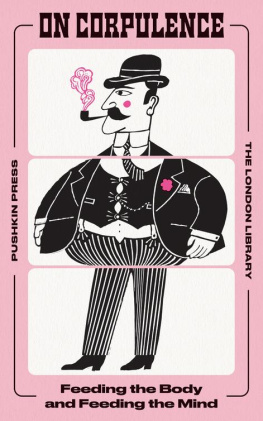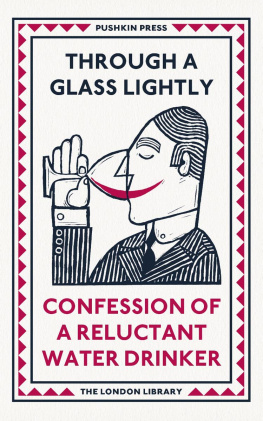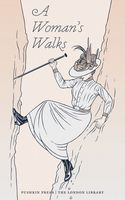It would be absurd to suppose that those persons who constitute the upper ranks of the middle classes in LONDON are ignorant of the regulations here laid down;but in the country (especially in the mercantile districts), where the tone of society is altogether lower, it is far otherwise, although country people may not feel inclined to acknowledge what is, nevertheless, strictly true.
If these hints save the blush but upon one cheek, or smooth the path into society of only one honest family, the object of the author will be attained.
LONDON , JAN. 20. 1836.
E tiquette is the barrier which society draws around itself as a protection against offences the law cannot touch,it is a shield against the intrusion of the impertinent, the improper, and the vulgar,a guard against those obtuse persons who, having neither talent nor delicacy, would be continually thrusting themselves into the society of men to whom their presence might (from the difference of feeling and habit) be offensive, and even insupportable.
Many unthinking persons consider the observance of Etiquette to be nonsensical and unfriendly, as consisting of unmeaning forms, practised only by the silly and the idle; an opinion which arises from their not having reflected on the reasons that have led to the establishment of certain rules indispensable to the well-being of society, and without which, indeed, it would inevitably fall to pieces, and be destroyed.
Much misconstruction and unpleasant feeling arises, especially in country towns, from not knowing what is expected, or necessary to be done on certain occasions, resulting sometimes from the prevalence of local customs, with which the world in general are not supposed to be acquainted.
Besides, in a mercantile country like England, people are continually rising in the world. Shopkeepers become merchants, and mechanics manufacturers; with the possession of wealth they acquire a taste for the luxuries of life, expensive furniture, gorgeous plate, and also numberless superfluities, with the use of which they are only imperfectly acquainted. But although their capacities for enjoyment increase, it rarely happens that the polish of their manners keeps pace with the rapidity of their advancement: hence such persons are often painfully reminded that wealth alone is insufficient to protect them from the mortifications which a limited acquaintance with society entails upon the ambitious. Pride often deters people from seeking the advice of the experienced, when the opportunity of receiving it is presented. It is to be hoped that the following remarks will furnish a guide through the intricacies of conventional usage, without risk to the sensitive, or the humiliation of publicly proclaiming the deficiencies of an imperfect education.
In all cases, the observances of the Metropolis (as the seat of refinement) should be received as the standard of good breeding.
Chap. I. Introductions
Never introduce people to each other, without a previous understanding that it will be agreeable to both.
There are many reasons why people ought never to be introduced to the acquaintance of each other, without the consent of each party previously obtained. A man may suit the taste, and be agreeable enough to one, without being equally so to the rest of his friendsnay, as it often happens, he may be decidedly unpleasing; a stupid person may be delighted with the society of a man of learning or talent, to whom in return such an acquaintance may prove an annoyance and a clog, as one incapable of offering an interchange of thought, or an idea worth listening to.
But if you should find an agreeable person in private society, who seems desirous of making your acquaintance, there cannot be any objection to your meeting his advances half way, although the ceremony of an introduction may not have taken place; his presence in your friends house being a sufficient guarantee for his respectability, as of course if he were an improper person he would not be there.
Should you, whilst walking with your friend, meet an acquaintance, never introduce them.
If you meet a male acquaintance giving his arm to a lady, take off your hat to him, instead of noddingas this last familiar mode of recognition looks disrespectful towards her.
In making introductions, take care to present the person of the lower rank to him of the higher; that is, the commoner should be presented to the peer, not the peer to the commoner; Dr. A. to Lord B., not Lord B. to Dr. A. Observe the same rule with ladiesthe lady (as a female) claiming the highest rank, it is to her the gentleman must be presented, not the lady to the gentleman.
Be cautious how you take an intimate friend uninvited even to the house of those with whom you may be equally intimate, as there is always a feeling of jealousy that another should share your thoughts and feelings to the same extent as themselves, although good breeding will induce them to behave civilly to your friend on your account.
Friendship springs up from sources so subtle and undefinable, that it cannot be forced into particular channels; and whenever the attempt has been made, it has usually been unsuccessful.
Never make acquaintances in coffee-houses or other public places. As no person who respects himself does so, you may reasonably suspect any advances made to you.
An adherence to Etiquette is a mark of respect; if a man be worth knowing, he is surely worth the trouble to approach properly. It will likewise relieve you from the awkwardness of being acquainted with people of whom you might at times be ashamed, or be obliged under many circumstances to cut.
The act of cutting can only be justified by some strong instance of bad conduct in the person to be cut; a cold bow, which discourages familiarity without offering insult, is the best mode to adopt towards those with whom an acquaintance is not deemed desirable. An increased observance of ceremony is, however, the most delicate way of withdrawing from an acquaintance; and the person so treated must be obtuse, indeed, who does not take the hint.

